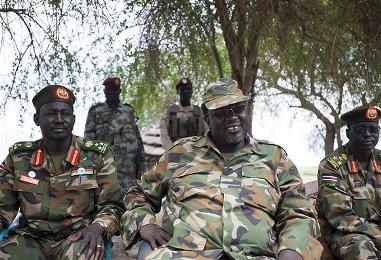South Sudanese rebel leader rejects transitional government without programme
May 3, 2014 (ADDIS ABABA) – South Sudan’s armed opposition leader, Riek Machar, has said he would only accept a transitional government that comes with a workable programme to be agreed upon by both parties to the conflict and implemented before next elections.

Kerry met with president Salva Kiir in Juba on Friday during which they discussed the importance of forming a power-sharing transitional government with Machar.
However, the rebel leader, who had been Kiir’s deputy for eight years, said any agreement on a power-sharing transitional government without a programme would be meaningless.
“I asked him (Kerry) what would be the purpose of a transitional government? It would not be workable without a programme to implement before elections come,” Machar told Sudan Tribune on Saturday.
“We need to have a peace agreement first with a new constitution. Putting [a] transitional government first is not realistic,” he added.
Machar who was sacked last year for criticising Kiir’s leadership style said the differences between him and the president had never been personal, denying the conflict was related to a power struggle between the two leaders.
He said the matter had been about the future governance of South Sudan, hence the need to restructure the state on the basis of a peace agreement and a federal constitution.
He said he had long pushed for peaceful democratic reforms within the ruling Sudan People’s Liberation Movement (SPLM) prior to fleeing for his life and forming an armed resistance.
He claims president Kiir had lost legitimacy for orchestrating the “genocide” in Juba against members of the Nuer ethnic group, to which Machar belongs, in mid-December last year, saying the international community is downplaying the atrocities which took place in the national, while continuing to talk about the recent killings in Bor or Bentiu.
The UN Mission in South Sudan says more than 200 civilians were killed while sheltering in a mosque in Bentiu after rebels recaptured the town from government forces based on their ethnicity and nationality.
Two days later armed youths stormed the UN base in Jonglei capital Bor, killing dozens after reportedly becoming angered by hearing residents inside celebrating the fall of Bentiu.
MACHAR REJECTS REGIONAL FORCE
Meanwhile, the rebel leader said he had reiterated his rejection of a rejection to the proposed deployment of a regional deterrent force under the auspices of the Intergovernmental Authority on Development (IGAD) to visiting US secretary of state John Kerry.
“I would agree to deployment of a protection force from the region as part of the current peacekeepers under the United Nations Mission in South Sudan (UNMISS), but not as a separate deterrent force that will fight against us like the Ugandan People’s Defence Force (UPDF),” he said.
He further accused the government and foreign forces allied with the Kiir government, including Uganda and Sudanese rebels, of allegedly violating the cessation of hostilities agreement signed by both sides in January.
FACE TO FACE TALKS PREMATURE
Machar also stressed there was no point in meeting Kiir face to face at this juncture of the negotiations between the two rival delegations, saying this “may be counter-productive”.
However, he added he had plans to meet with Ethiopian prime minister Haile Mariam Desalegn soon.
US ambassador to the United Nations Samantha Power on Friday said the two South Sudanese leader must meet to reach an agreement to end the suffering of South Sudanese, saying “We urge president Kiir and Riek Machar to swiftly agree on a date for face to face talks”.
The opposition leader further accused Kiir’s government of releasing seven former political detainees on “bail”, while keeping the other four recently released politicians under “house arrest” in Juba despite assurances to free them.
The group of 11 had been accused of collaborating with Machar to organise an alleged coup plot in December to overthrow the government, which triggered the violence.
He also accused the government of violating the January cessation of hostilities agreement by not withdrawing Ugandan forces, as well as Sudanese rebels, fighting alongside the South Sudanese army (SPLA).
“The government also denies humanitarian access to the areas under our control,” Machar said, accusing Juba of launching further offensives against rebel positions despite the resumption of peace talks last week in the Ethiopian capital, Addis Ababa.
REBELS DENY MACHAR RELOCATED TO ETHIOPIA
The South Sudanese rebels have also denied on reports claiming that Machar had relocated to the Ethiopian border, allegedly due to fears over insecurity.
“Who said that? Dr Riek Machar has not relocated anywhere. He is inside South Sudan,” Hussein Maar Nyuot, a spokesperson for the rebel delegation in Addis Ababa, told Sudan Tribune on Friday in a separate interview.
The rebel official was reacting to reports which appeared on social media and forums claiming that the opposition leader had been forced to relocate to Burebiey village on the Ethiopian side of the border following claims that some armed Nuer youth in Upper Nile state’s Nasir town had declared allegiance to Upper Nile state governor Simon Kun Puoch.
Further unconfirmed reports also on social media and online forums claimed that rebel stronghold Ulang county was captured by SPLA forces after the local chief, identified as Tut Thon, declared allegiance to governor Puoch.
However, Machar’s spokesperson, James Gatdet Dak, has since confirmed to Sudan Tribune that government forces did overrun Ulang and set it ablaze.
He said the SPLA was later repulsed by the White Army that reinforced the area from Nasir and that rebels had regained control of the area since Saturday.
(ST)
